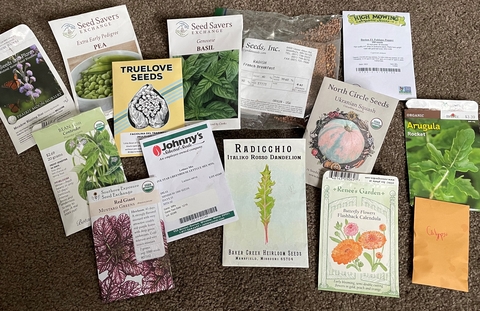Seed shortages in 2021
UNIVERSITY OF MINNESOTA EXTENSION - www.extension.umn.edu
If you’ve been browsing seed catalogs lately, you may have noticed that many varieties have completely sold out, and some companies have stopped taking orders from gardeners entirely. There are reasons for seed shortages and ways to get access to the seeds you need.
Is there really a seed shortage?
The seed shortages we are seeing reflected on seed company websites are complex, and don’t necessarily mean that there is an actual shortage of seeds. There are many factors playing into the “sold out” messages on some of our favorite varieties. Some of those factors include:
A surge in demand
Last year, we saw unprecedented seed sales at the onset of COVID-19, and companies struggled to keep up with demand. Griffin, a large horticultural supply company, conducted a survey of 1,000 first time gardeners in 2020, and 80% of them said that they would probably or definitely continue gardening in 2021. Based on early seed sales in 2021, it seems that the resurgence in gardening is indeed going to continue this year.
Many companies responded to the pandemic by ordering more seed for 2021. Seed companies buy from farmers, who grow crops specifically for seed, and so this meant bringing in new growers and asking current growers to produce more seed for this year. However, many of these contracts are negotiated early in the year (pre-pandemic in 2020), so some companies may not have been able to account for the increased demand last year. These companies tend to keep plenty of seed in stock so they do not run out entirely, and have had more time to account for increased demand in 2021.
Delays in packing
Seed companies tend to store seeds in bulk, and repackage them into seed packets throughout the year. Due to COVID-19 workplace safety precautions, this process has been slow for many companies.
While many seed companies anticipated higher demand, they continue to operate more slowly than they would in non-pandemic conditions, which means it can be difficult to keep up with orders. Smaller seed companies may just have 1 or 2 people processing orders, so with increasing demand, it’s both hard to keep up and hard to predict availability.
Localized shortages
Every year we see seed shortages with specific varieties. Because seed has to be grown in the natural world, insects, diseases, hail, floods and droughts can have an impact on crops grown for seed.
If there are only a few growers of a certain variety of carrots, and one of them loses a substantial portion of their crop, there will likely be a shortage of that variety in the following year. However, there will be plenty of other varieties to choose from.
As you’re looking at seed catalogs and seeing that many of your favorite varieties are sold out, or perhaps one of your favorite companies is no longer selling to gardeners, do not panic. The seed supply is not depleted, it has simply been a challenging year to manage increased demand.
Where can you still find seeds?
- Support your local gardening store. Even if some seed companies are not selling directly to gardeners, you can still find their seeds on racks at many of your local gardening stores and grocery stores.
- Attend a seed swap! See if your community has a local seed library, or a seed saving group. Many seed saving groups are doing online seed swaps this year and finding creative ways to share seeds safely with community members.
- There are still plenty of seeds available through seed company websites, you may just need to be a bit flexible with variety selection if one you want has sold out, or buy it from a different vendor.
- Explore smaller seed companies. Many gardeners use the same 3 or 4 companies every year to purchase seeds. But there are so many local and regional seed companies to choose from! Some Minnesota vegetable seed companies include: Jordan Seeds, North Circle Seeds, and Superior Seed Company (it’s very possible there are more that I am not familiar with).
I have extra seeds. How can I share them with others?
Many growers only have space for a few plants of each variety, but the minimum number of seeds in a seed packet is often 25-100. This means that if you’ve ordered seeds this year, you may have plenty of extras to share.
If you have leftover seed from last year, they should be fine to plant and share again. Consider planning a seed swap with neighbors or putting up a little free seed library. If you have extra space to start seeds indoors, you might even consider starting seeds and sharing transplants with your neighbors. Make sure to label everything well.
If your seeds are saved from your garden, only share seeds from healthy plants so that you’re not transmitting any pathogens to your neighbors. Hot water treatment can help to prevent many diseases from spreading via seed.
If you do not currently save seed, take some time this year to learn about seed saving and consider saving some of your seeds in 2021.

